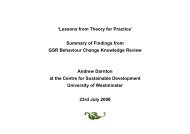Cultural Diversity - The Civil Service
Cultural Diversity - The Civil Service
Cultural Diversity - The Civil Service
Create successful ePaper yourself
Turn your PDF publications into a flip-book with our unique Google optimized e-Paper software.
Land Registry <strong>Cultural</strong> <strong>Diversity</strong>Jainism<strong>The</strong>re are thought to be between 25-30,000 Jains in Britain. Estimates vary althoughthe community is probably growing.No statistics are officially collected but community sources say that the most popularareas for the Jain community are North West London, Leicester and Coventry. In theUK there are four Jain places of worship of which three are in the Greater Londonarea and one in Leicester.<strong>The</strong> precise origins of Jainism cannot be traced, but it began in India. <strong>The</strong> term Jainmeans a follower of the Jinas (Spiritual Victors), a line of human teachers who arebelieved to have existed from time immemorial and to have attained kevalajnana(infinite knowledge) and perfect purity through their own spiritual efforts. <strong>The</strong> Jinas arealso known as Tirthankaras. Jains believe that in the present cosmic cycle there havebeen twenty-four Tirthankaras who have taught others the tenets of Jainism.<strong>The</strong> twenty-fourth Tirthankara was Vardhamana, usually called Mahavira (the GreatHero).When he was thirty years old he left home on a spiritual quest. Jains affirm that aftertwelve years he attained kevalajnana (omniscience). Shortly after this, eleven learnedmen came to the place where Mahavira was in order to challenge him, but when heanswered their doubts they became his disciples and later on the Ganadharas(leaders) of the fourfold order of monks and nuns, laymen and laywomen which hefounded.Key beliefs and holy writingsJain scriptures are known as the Shruta, Agamas or Siddhanta (doctrine) whichcomprise the canonical literature containing the teachings of Mahavira and otherTirthankaras.Ahimsa<strong>The</strong> cardinal principle of Jainism is ahimsa, generally translated as non-violence,although it goes far beyond that to encompass the avoidance of all physical or evenmental harm to any living being.Jainism is a religion without a belief in a creator god. According to its scriptures, thereis akasha (infinite space) within which there is a finite area called loka (the universe).Within this universe there are an infinite number of jiva or atmas (sentient beings).16

















